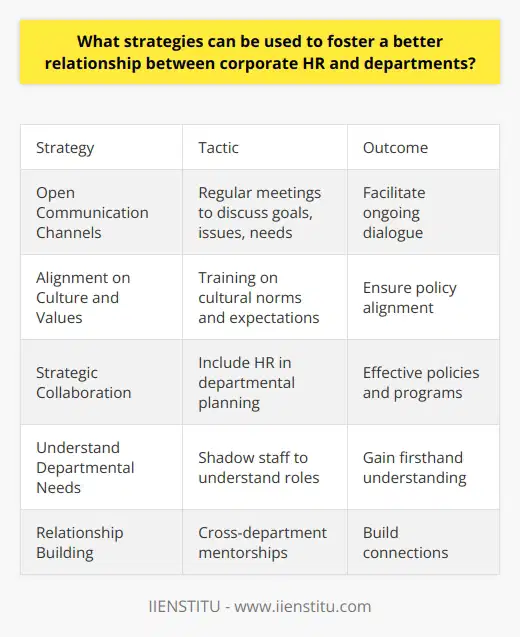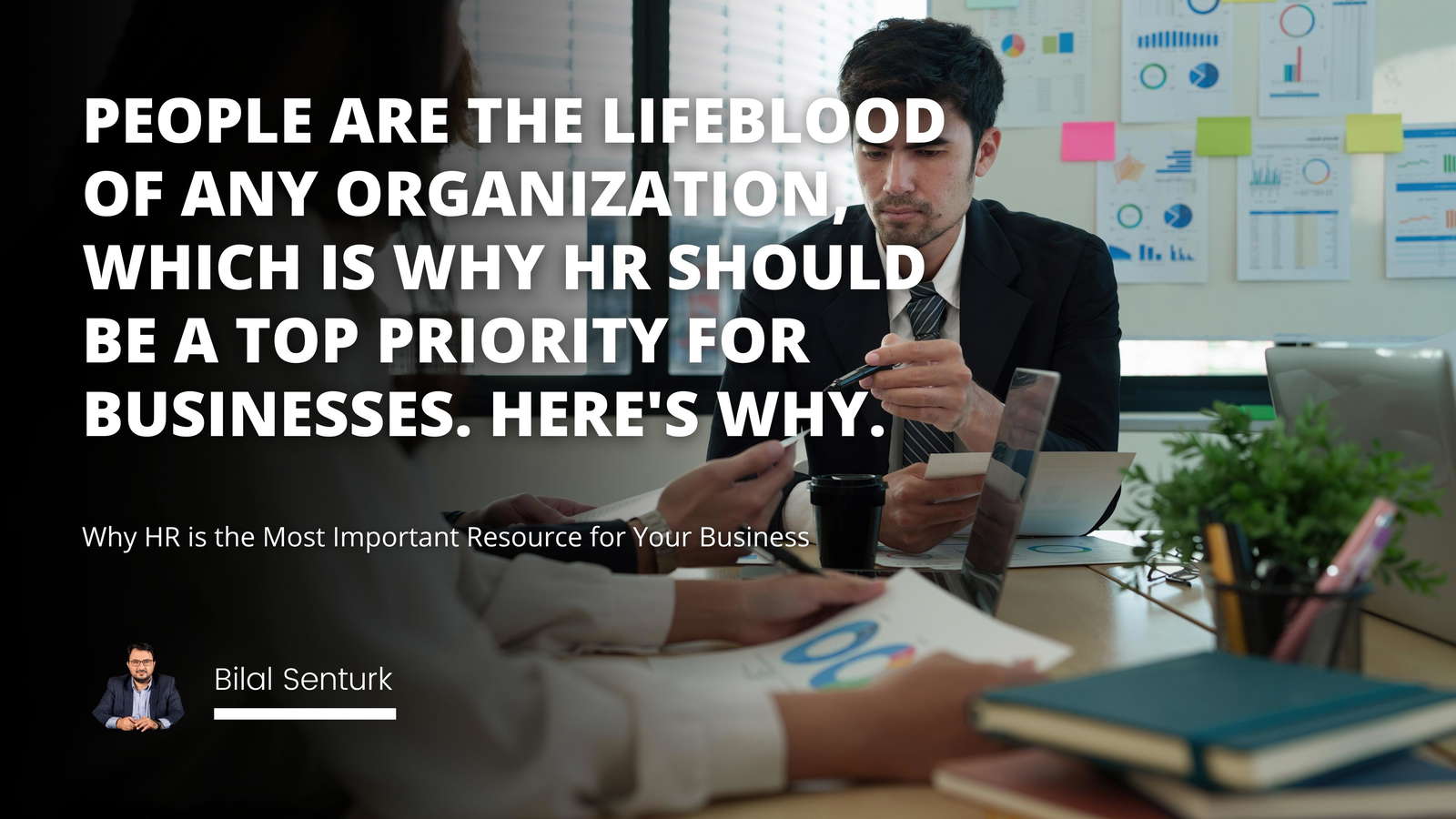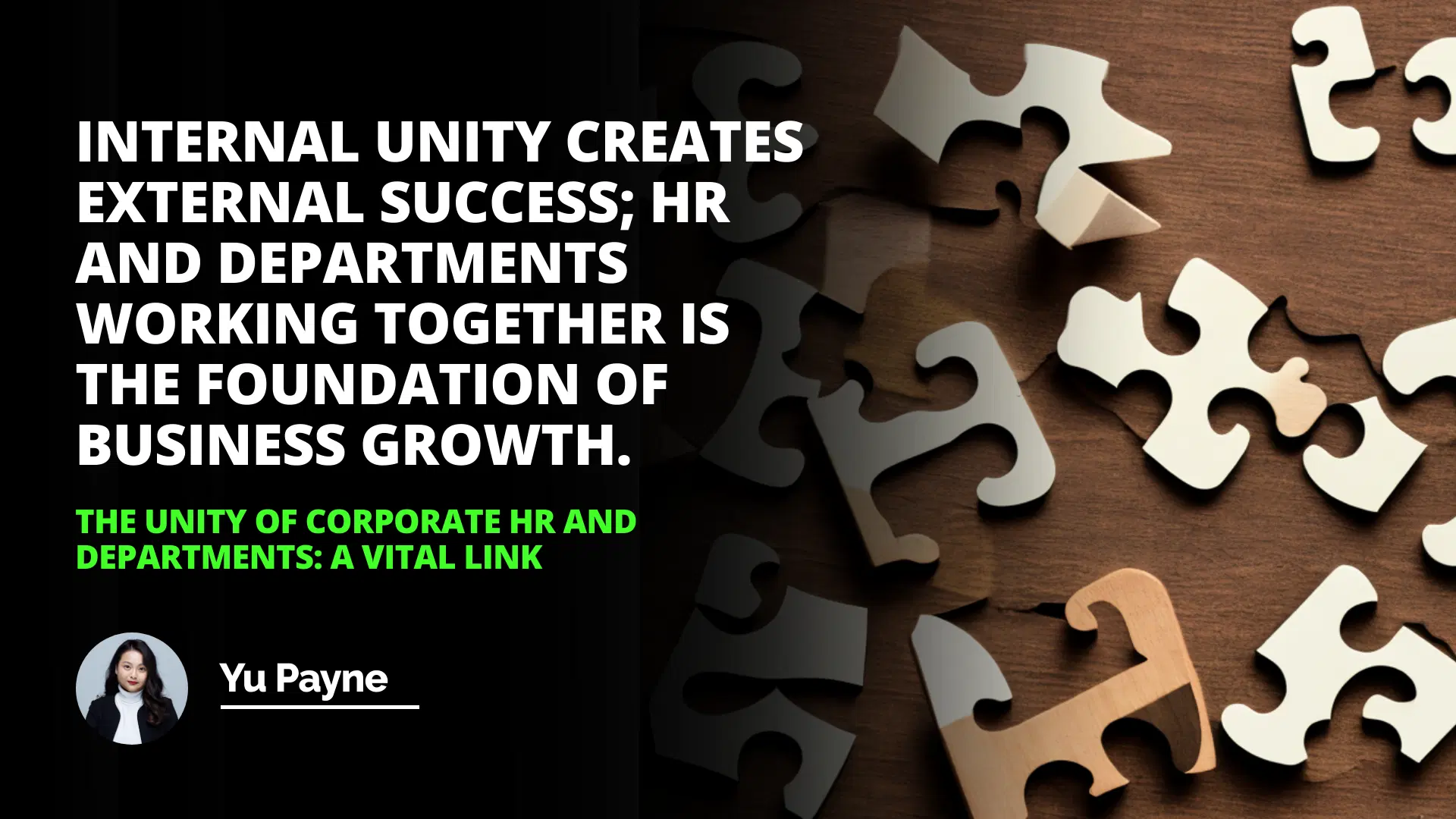
Introduction
Overview of Corporate Human Resources
Impact of Existing Interaction Between HR and Other Departments
Evidence of Unity
Benefits from Collaborative Decision Making
Improvement in the Quality of the Final Outcome
Challenges Signifying the Need for Unity
Identifying and Overcoming Cultural Misalignment
Aligning Objectives of HR and Other Departments
The Benefits of Strong Linkages
Effective Talent Management
Facilitation of a Unified Vision
Conclusion
Summary of Benefits from Effectual Link between Corporate HR and Departments
Impact of Strengthened Connections on Overall Performance
Introduction
The purpose of corporate Human Resources (HR) aims to ensure that the organization’s employees are utilized and performing to their highest potential. To do this, corporate HR must effectively connect to other departments. This connection is vital for the company to function in a meaningful and successful manner. Therefore, the unity of corporate HR and other departments is essential to driving corporate performance.
Evidence of Unity
The unity of corporate HR and other departments hinges on effective collaboration. Much like a well-oiled machine, well-aligned departments are more likely to produce positive outcomes. In the case of corporate HR and other departments, the benefits of collaborative decision-making are apparent. For example, project teams with HR involvement can analyze the strengths of the entire organization rather than just the department for which a particular decision is intended. This results in a much more informed decision-making process that is more likely to lead to satisfactory outcomes.
Furthermore, this collaboration results in an improvement in the quality of the outcome. When HR is involved in any decisions made by the other departments, it allows for a more objective view. The office of HR can provide invaluable insight and expertise into how decisions made by other departments might affect overall corporate performance. This also helps to ensure that policies and technology are aligned, increasing efficiency throughout the organization as a whole.
Challenges Signifying the Need for Unity
Identifying and overcoming cultural misalignment is part of the challenge of establishing strong links between corporate HR and other departments. This misalignment occurs when different departments view the same issues differently. For example, the IT department may share different views on employee engagement than the Sales department. To properly assess the situation and come to an effective agreement that all departments agree on, HR must be present to mediate between departments to bridge the gap.
Another challenge that signifies an urgent need for unity is that the objectives of HR and other departments are typically disparate. It’s not uncommon for the office of HR to strive for adherence to certain principles and guidelines, whereas other departments may be operating under different objectives altogether. Again, the role of HR is valuable in bridging this gap and ensuring that the goals of each department are aligned with one another.
The Benefits of Strong Linkages
The importance of effective linkages between corporate HR and other departments cannot be overemphasized. Such links can have a substantial and positive impact on how an organization performs overall. One of the most significant benefits of such linkages is effective talent management. With HR and other departments working in tandem, it’s much easier to identify and assess the available talent. This allows for better deployment and utilization of the organization’s resources, leading to increased efficiency and improved performance.
Furthermore, strong linkages between corporate HR and other departments can facilitate the development of a unified vision within the organization. As a result, HR is uniquely positioned to help cultivate a sense of pride and ownership, encouraging employees to be more engaged and motivated. This helps create an environment where everyone is working towards the same goal and increases the organization’s chances of success.
Conclusion
The unity of corporate HR and other departments is necessary to drive corporate performance. This unity is marked by an effective collaboration between departments, which allows for comprehensive decision-making and industry best practices. Several challenges associated with this unity need to be addressed for it to be successful, but the benefits are undeniable.
Effective talent management and establishing a unified vision throughout the organization are the most critical of these benefits. When the link between corporate HR and the other departments is strong, the organization has a higher chance of success.
Internal unity creates external success HR and departments working together is the foundation of business growth
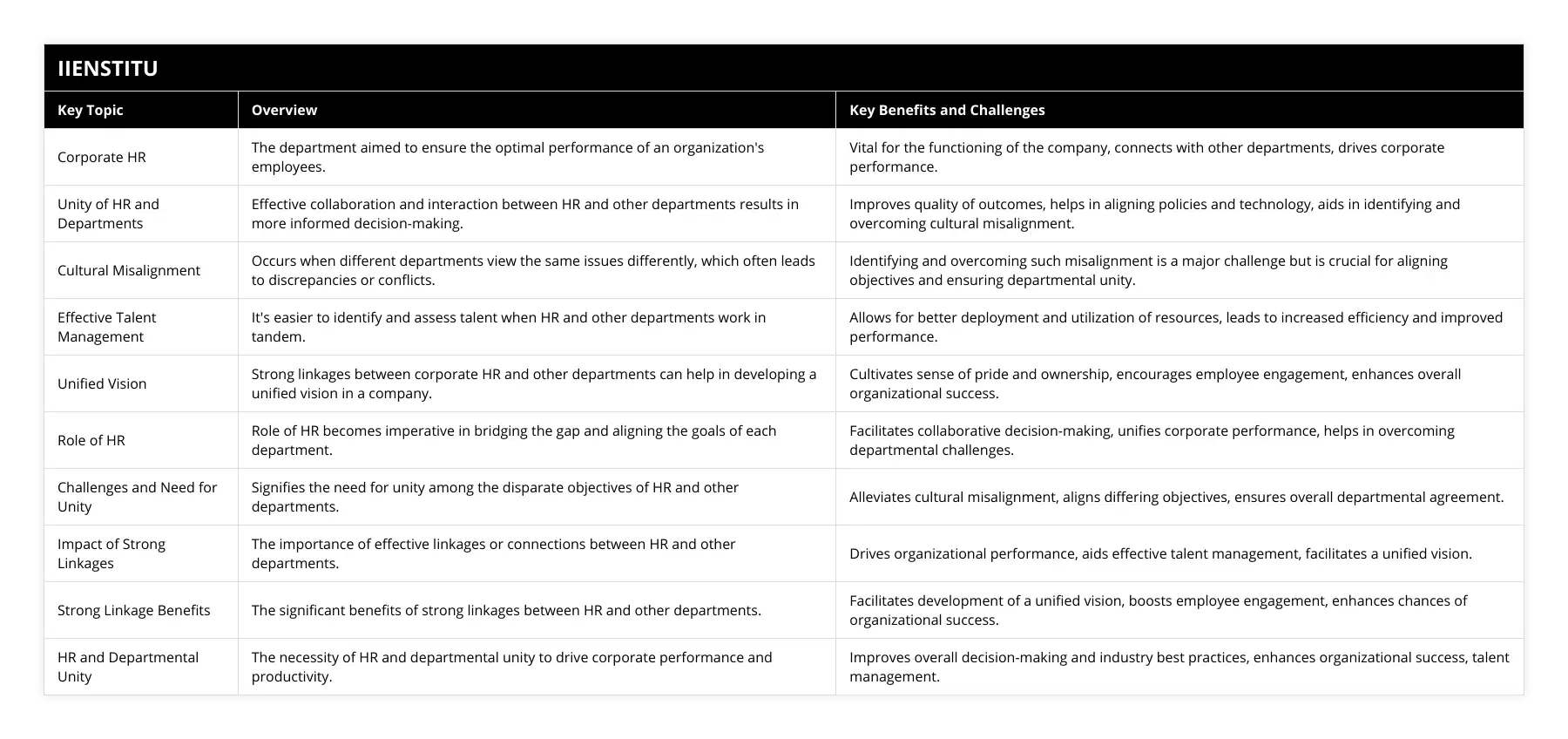
Frequently Asked Questions
How can a strong corporate HR and department link improve organizational performance?
Organizations, both publicly and privately owned, need to be improving and striving for excellence constantly. One way to do this is through the continual advancement of their corporate Human Resources (HR) and related departments. Fostering and improving strong intra-organizational relationships, investing in culture- and process-oriented HR practices, and developing and maintaining a skilled workforce all help to build a cohesive and successful organization.
The first step to an effective HR department is ensuring solid intra-organizational relationships. Building robust relationships throughout the organization from top to bottom is essential for creating an environment of collaboration, innovation, and trust. When all members of the organization are kept in sync and all relevant information is shared, it allows for a transparent and open organizational process, facilitating problem-solving and encouraging team-building.
In addition, HR must strive for continuous improvement in its processes and communication. Process-oriented HR practices, such as data analyses, training, goal-setting, regular focus groups, and surveys, are all powerful means of achieving an improved organizational atmosphere. In addition, investing in culture-oriented practices, such as leadership development, team building, and creative reward systems, help foster a sense of purpose and belonging and boost morale.
Finally, an organization must maintain a skilled and competent workforce. Investing in the recruitment, training, and retention of high-quality personnel is essential to an organization’s success. Developing a system of career and personal development opportunities benefits the employee and the organization alike and encourage the workforce to perform at their highest level.
In summary, a solid corporate HR and department link can improve organizational performance by facilitating strong relationships, implementing process- and culture-oriented HR practices, and investing in recruiting and training high-quality personnel throughout the organization. As a result, employees will be more engaged, and productivity will increase, leading to improved organizational performance.
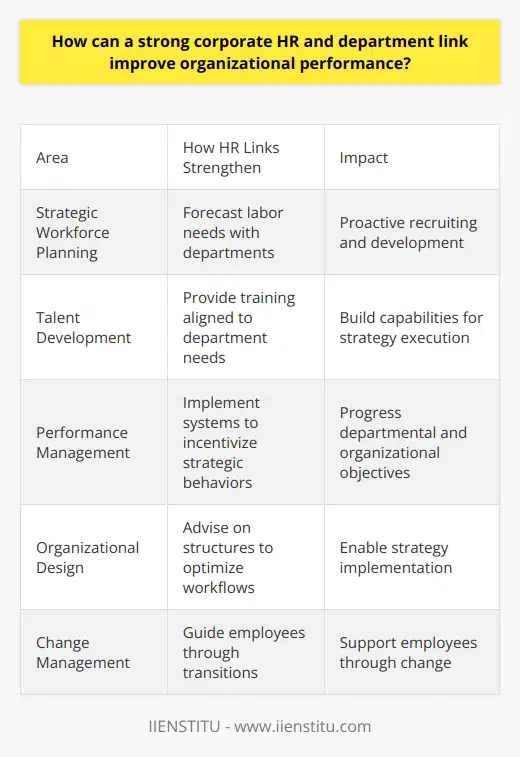
What are the benefits of strong communication between corporate HR and departments?
Effective communication between corporate Human Resources (HR) departments and other departments within an organization can be highly beneficial. It helps to facilitate the sharing of information, resources, and support among each department, improving both efficiency and performance. By using strategic communication and collaboration, organizations can realize a number of advantages, including improved recruitment initiatives, better employee engagement, increased productivity and morale, higher comradery among teams, and even lowered labor costs.
One of the major benefits of strong communication between corporate HR and other departments is improved recruitment. As different departments may require different skills and qualifications, communicating efficiently and effectively allows these departments to collaborate more effectively and quickly to find and identify the most appropriate and talented candidates for the job. Additionally, HR can assist with the selection process, providing valuable insights and feedback on the suitability of potential candidates.
Communication between corporate HR and other departments also promotes better employee engagement. When departments can better collaborate with HR, they can quickly identify what improvement initiatives, training, education, and resources are necessary to provide employees with the tools and skills needed to help them succeed. As a result, employees can become more engaged in the organization and be better equipped to take on greater challenges, thereby increasing productivity and morale.
Moreover, strong communication between corporate HR and other departments can help to foster team camaraderie. By communicating regularly, organizations can discuss any upcoming challenges and ensure that the right resources and support mechanisms are in place to help teams work together. This can greatly improve the working environment, motivating teams to achieve tremendous success and collaborate more effectively to reach desired outcomes.
Finally, effective communication between corporate HR and other departments can also help to lower labor costs. As HR can assist departments in developing more effective recruitment initiatives and share talented candidates, department heads may be able to find personnel solutions without incurring expensive recruitment agency fees. Additionally, by working together, corporate HR and other departments can develop more efficient project management solutions and practices, helping to avoid overspending on unnecessary resources and personnel.
In conclusion, there are many benefits of strong communication between corporate HR and other departments. This communication can help create more efficient recruitment initiatives, better prepare employees to perform their jobs, and foster collaborative environments. Additionally, it can assist in lowering labor costs and provide valuable insights, helping departments and organizations fulfill their goals and objectives more effectively.
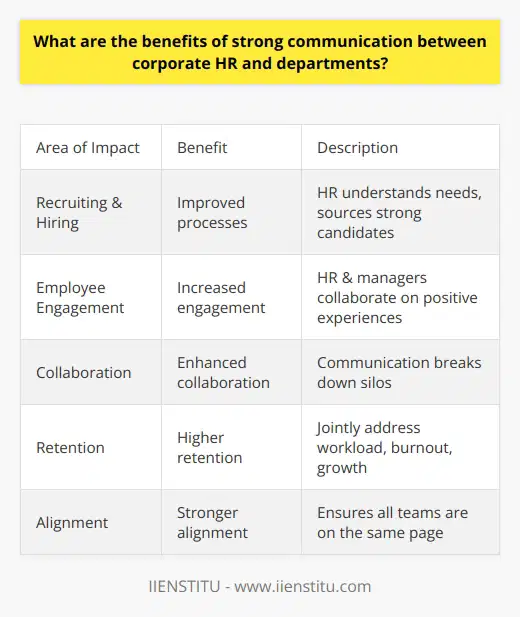
What strategies can be used to foster a better relationship between corporate HR and departments?
Successful organizations understand the importance of internal solid relationships between corporate HR and departments. When a positive synergy exists, the organizational environment is better suited to meet individual and collective goals. This article explores the strategies leaders should employ to foster a better relationship between corporate HR and departments.
The first strategy is to ensure that communication remains open and ongoing. Communication provides the foundation for a successful relationship between corporate HR and departments. When there is a disconnect in communication, misunderstandings, and misinformation can hinder progress. Leaders should communicate change updates and directives in a timely fashion, and departments should provide HR with updated information regarding their staff, progress, and problems.
The second strategy is to develop an understanding of the organizational culture. A successful organization has an established culture and knowledge of how the organization functions. Corporate HR and departments should collaborate and develop a shared understanding of goals and internal processes. When an understanding gap exists in how corporate HR and departments operate, it can create tensions and hinder progress.
The third strategy is to create a joint mission and shared vision. Setting common goals and shared dreams for the future helps foster better relationships between corporate HR and departments. Agreeing on short-term and long-term goals helps align the priorities of both offices and ensures that everyone is on the same page and working together to achieve common objectives.
The fourth strategy is to understand the needs and concerns of both corporate HR and departments. Leaders should take the time to understand each office's challenges and how they can be addressed. This can help create a sense of shared responsibility and commitment to success within the organization.
These strategies can be used to foster a better relationship between corporate HR and departments. Open communication and understanding the cultures and perspectives of each side should be the foundations of the building and maintaining a solid relationship. The work of leaders at all levels should be to develop a joint mission and shared vision while remaining aware of the needs and challenges faced by each other. When leaders take the initiative to understand the perspectives of both sides and develop an atmosphere of open communication, corporate HR and departments can exist in a symbiotic relationship, and the potential for success in the organization and for each department is significantly increased.
